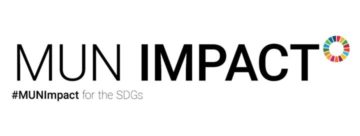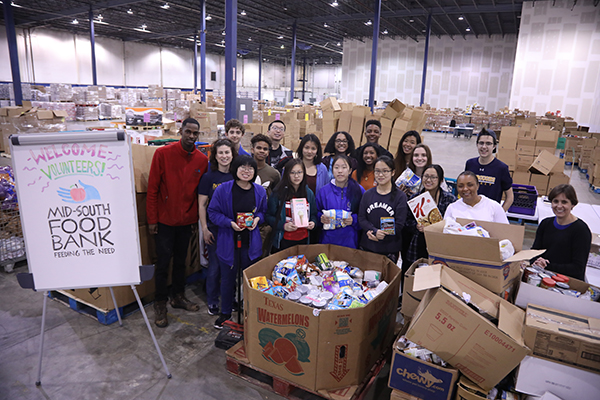The John Burroughs School (JBS) service learning program, which including many MUN and MUN Impact students, traveled to Memphis, Tennessee for an alternative spring break trip last week. Every project the students were engaged in was directly connected to an SDG. The work the students did was educational and inspiring.
On Monday morning, students visited the Porter-Leath Hanley Head Start program that serves at-risk children and families in the Shelby County area. Students from JBS found themselves immediately tackling SDG 4-2 & 4-6 as they engaged one-on-one with 3 to 5 year olds in the pre-primary education program, working on their literacy and numeracy skills. The experience was eye opening when the JBS students learned that this particular Head Start program serves over 5,000 children in the county every year and how important those Pre-K years are in formulating success throughout a child’s entire school experience leading into improved family formation, increased number of job hours worked, avoidance of criminal behavior and reliance on social support, even proof of increased earnings and better health; these things all stem from enrollment in pre-kindergarten. The debriefing at the end of the program made the students aware of how the work at the program also tackles SDG 10 to reduce inequalities.
On Monday afternoon, students were busy sorting and packaging food supplies at the Mid-South Food bank, an enormous facility that distributes food to several states in the Mid-south region of the US. JBS students were very aware of SDG 1 (no poverty) and SDG 2 (zero hunger), as they learned that the food was coming directly from the US Food and Drug Administration (FDA), local food producers and Big Box stores who donated the food as a result of good policies or simply over stocking. It was challenging to see unused food go to waste as students had to spot dented cans of fruits and vegetables and take note of expiration dates and follow a strict code of boxing only the products that did not expire within the next 3-8 months.
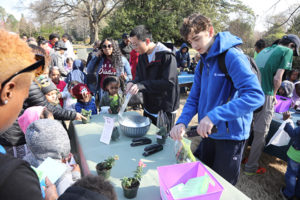 On Tuesday morning the students volunteered at the Memphis Botanics Garden who were hosting a gardening program that focused on environmental education. On Tuesday afternoon the students visited the St. Jude Children’s Research Hospital, founded in 1962 as a pediatric treatment and research facility focused on children’s catastrophic diseases, particularly leukemia and other cancers. The students learned that the hospital costs $2.8 million USD a day to run, and there is no cost to the patient to be treated.
On Tuesday morning the students volunteered at the Memphis Botanics Garden who were hosting a gardening program that focused on environmental education. On Tuesday afternoon the students visited the St. Jude Children’s Research Hospital, founded in 1962 as a pediatric treatment and research facility focused on children’s catastrophic diseases, particularly leukemia and other cancers. The students learned that the hospital costs $2.8 million USD a day to run, and there is no cost to the patient to be treated.
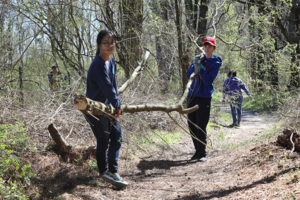 On Wednesday morning the students got their feet wet and their hands dirty volunteering at the Wolf River Conservancy, thinking critically and actively engaged with SDG 6, 11, 12, 14 and 15. The students started by clearing trash along the banks for the Wolf River, all the while listening to the Conservancy representative talk about the importance of the river aquifer. The spring-fed Wolf River rises in north Mississippi and flows northwest through Shelby county to join the Mississippi River in Memphis. Carving a green passage through 90 miles of forests, fields, and communities, the Wolf’s upper reaches are lush wetlands of unmatched natural beauty that help recharge the drinking water aquifer.
On Wednesday morning the students got their feet wet and their hands dirty volunteering at the Wolf River Conservancy, thinking critically and actively engaged with SDG 6, 11, 12, 14 and 15. The students started by clearing trash along the banks for the Wolf River, all the while listening to the Conservancy representative talk about the importance of the river aquifer. The spring-fed Wolf River rises in north Mississippi and flows northwest through Shelby county to join the Mississippi River in Memphis. Carving a green passage through 90 miles of forests, fields, and communities, the Wolf’s upper reaches are lush wetlands of unmatched natural beauty that help recharge the drinking water aquifer.
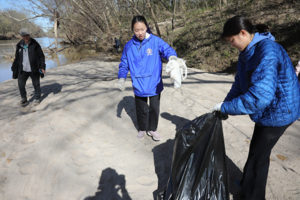
The team then went on land for the next few hours and cleared Privet from the forest along a nature walking path in the park. Privet is an invasive shrub from southern and eastern Asia that outcompetes and therefore displaces native vegetation. Overall the experience with the Conservancy made the students more hypersensitive to the connections with the environment on land and in the water, focusing on the sustainable management and use of natural resources (Target 12-2), improving water quality, increasing water-use efficiency and ensure freshwater supplies (Target 6-4), and protecting and restoring water-related ecosystems (Target 6-6).
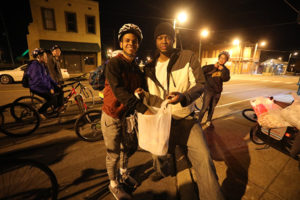 On Wednesday night the students joined the Urban Bicycle Food Ministry for their weekly food delivery program (by bike) on the streets of Memphis. It was an incredibly humbling experience to meet so many of the homeless population of the city who seek the food and good company and love from strangers. Conversation with the team leader after the food distribution focused on the debate between providing a meal to a human being who may not have eaten that day vs enabling the homeless and not solving the greater issue. In the end many Burroughs students were thinking about SDG 1 (target 1-3 and 1-A) to end poverty and wanted to start a similar Urban Bicycle Food distribution program for downtown St. Louis. In order to do so, students would have to mobilize resources to implement policies to end poverty, and combat the challenges from the St. Louis Police Department who strongly discourage such food distribution programs.
On Wednesday night the students joined the Urban Bicycle Food Ministry for their weekly food delivery program (by bike) on the streets of Memphis. It was an incredibly humbling experience to meet so many of the homeless population of the city who seek the food and good company and love from strangers. Conversation with the team leader after the food distribution focused on the debate between providing a meal to a human being who may not have eaten that day vs enabling the homeless and not solving the greater issue. In the end many Burroughs students were thinking about SDG 1 (target 1-3 and 1-A) to end poverty and wanted to start a similar Urban Bicycle Food distribution program for downtown St. Louis. In order to do so, students would have to mobilize resources to implement policies to end poverty, and combat the challenges from the St. Louis Police Department who strongly discourage such food distribution programs.
Service learning and learning to serve were the focus of this Spring Break program. By connecting the programs of this trip with the goals of the UN, students learned how we can tackle the world’s problems one volunteer, one concerned citizen, one step, at a time.
